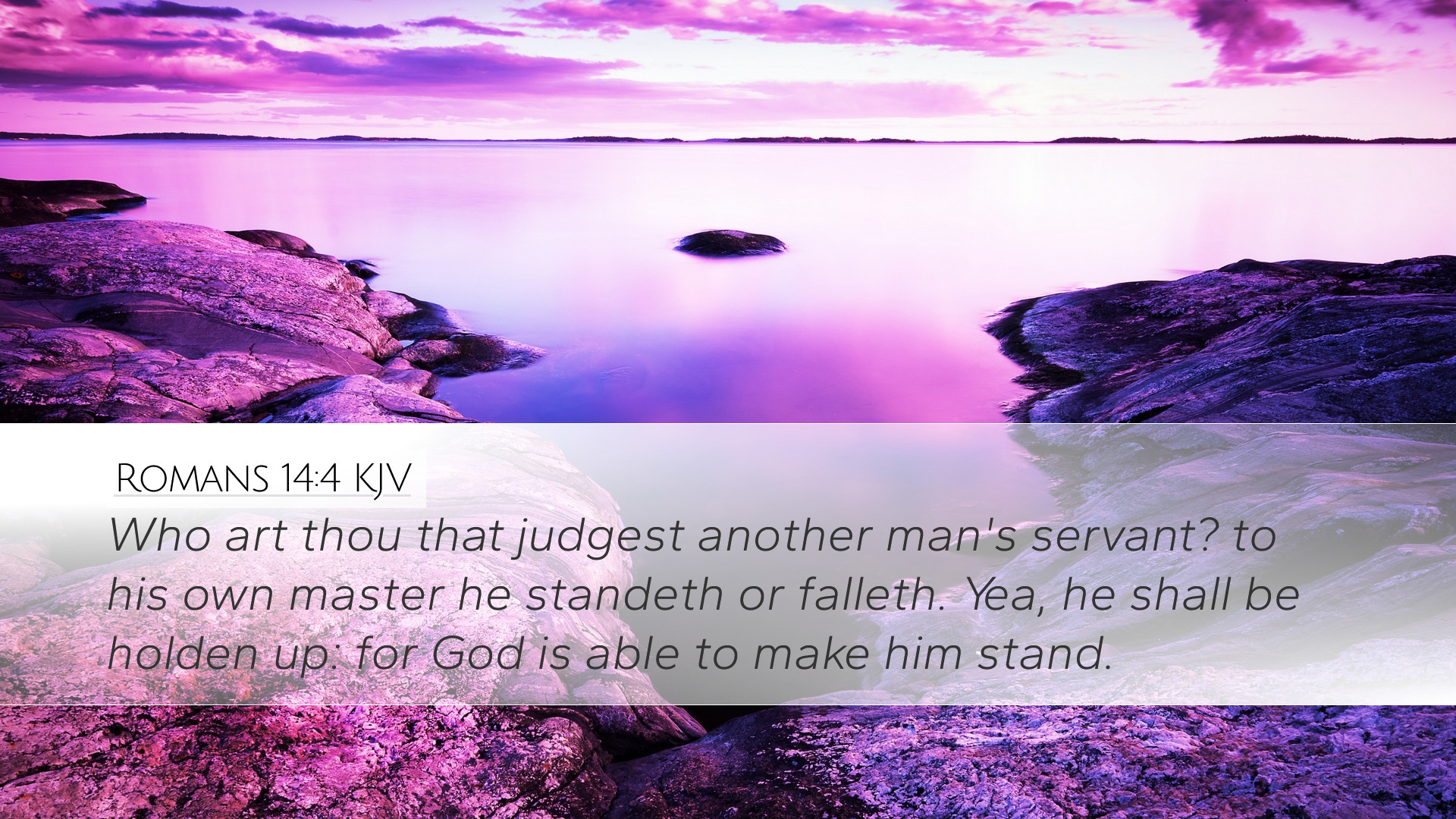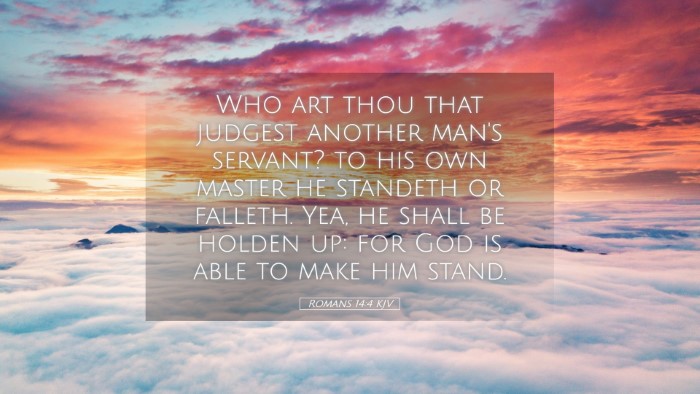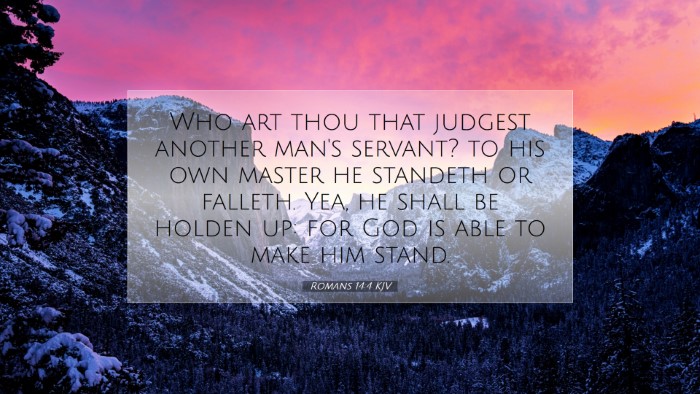Old Testament
Genesis Exodus Leviticus Numbers Deuteronomy Joshua Judges Ruth 1 Samuel 2 Samuel 1 Kings 2 Kings 1 Chronicles 2 Chronicles Ezra Nehemiah Esther Job Psalms Proverbs Ecclesiastes Song of Solomon Isaiah Jeremiah Lamentations Ezekiel Daniel Hosea Joel Amos Obadiah Jonah Micah Nahum Habakkuk Zephaniah Haggai Zechariah MalachiRomans 14:4
Romans 14:4 KJV
Who art thou that judgest another man's servant? to his own master he standeth or falleth. Yea, he shall be holden up: for God is able to make him stand.
Romans 14:4 Bible Commentary
Commentary on Romans 14:4
Text of the Verse: "Who art thou that judgest another man's servant? to his own master he standeth or falleth. Yea, he shall be holden up: for God is able to make him stand."
Introduction
This verse is part of a larger discourse in the Epistle to the Romans where the apostle Paul addresses the issues of judgment and liberty among believers. Romans 14 encourages Christians to accept one another without passing judgment on disputable matters (issues of personal conscience and opinion). A thorough understanding of this verse is crucial for anyone involved in pastoral theology, Christian counseling, or leadership within the church.
Exegesis and Analysis
- Judgment Among Believers: The verse opens with a rhetorical question aimed at those who are quick to judge others. This question underscores the futility of such behavior as it challenges the motive and authority behind the judgment.
- The Nature of Servanthood: The phrase “another man's servant” emphasizes the personal relationship that exists between a servant (believer) and their master (God). Each believer is accountable to God alone, highlighting the personal nature of faith.
- Standing or Falling: The second part of the verse encapsulates the reality that each servant "standeth or falleth" based on their relationship with God, not upon the perceptions of others. This reinforces the idea that it is God who sustains or upholds believers in their faith.
- The Sufficiency of God: The concluding statement, “for God is able to make him stand,” offers profound encouragement. This speaks to God’s sovereignty and capability, reminding believers that their standing in faith ultimately relies on His power, not human expectation.
Insights from Public Domain Commentaries
Matthew Henry
Matthew Henry emphasizes the importance of humility within the church and warns against the pride that can lead to judgmental attitudes. He interprets the verse as a call to recognize God’s sovereignty in the lives of believers, suggesting that it is inappropriate to elevate oneself above another, especially when both serve the same Master. He notes that the diversity of opinion regarding non-essential matters, such as dietary laws and observance of days, should not lead to division, as each believer is under God’s authority.
Albert Barnes
Albert Barnes elaborates on the idea that believers are ultimately accountable only to God. He explains that in the context of a servant-master relationship, it is improper for one servant to judge another. His commentary underscores the principle that God provides the necessary support for believers, urging them to focus less on each other’s weaknesses and more on the strength that God offers. Barnes also highlights the theological depth of God’s ability to sustain believers, invoking themes of grace and divine enablement.
Adam Clarke
Adam Clarke takes a more practical approach, relating this verse to the issues facing the early church, particularly in Rome, where tensions arose from differing backgrounds and beliefs. He stresses the importance of understanding that God will support each person according to their specific context and scruples. Clarke also notes that the phrase “standeth or falleth” signifies spiritual stability and readiness, calling believers to find confidence in their secure position in Christ as they navigate communal life.
Theological Implications
- Christian Liberty: This verse encapsulates the broader theme of Christian liberty, urging believers to exercise grace and understanding toward differing opinions on debatable issues while remaining committed to personal convictions.
- Accountability to God: The focus on accountability implies that our relationship with God is deeply personal, and coercion by peers should not undermine that relationship.
- Unity in Diversity: The call to avoid judgment serves to foster an environment where unity can flourish in the midst of diversity, reflecting the body of Christ working together despite differences.
Practical Applications
- Encouragement for Pastors: Pastoral leaders should embrace the principles delineated in this verse by fostering an inclusive church environment where grace abounds, and members are encouraged in their own spiritual journeys.
- Guidance for Believers: Individual believers are invited to examine their own judgmental tendencies and cultivate empathy and support for one another, recognizing the personal nature of each person’s walk with God.
- Faith Communities: Churches can benefit from discussing differences openly while centering their discussions around the gospel and recognizing that ultimately, it is Christ who holds them together.
Conclusion
Romans 14:4 serves as a powerful reminder of the sovereignty of God and our individual responsibility as believers. As we navigate our faith journeys, it is essential to uphold each other in love rather than engage in judgment. This text encourages not only personal reflection but also strengthening the communal bonds within the church, cultivating an atmosphere of grace and support. Pastors, students, and scholars alike can draw from this rich verse to promote unity and deeper understanding in the body of Christ.


